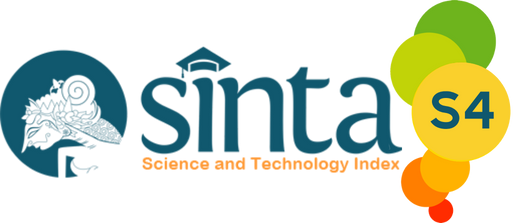Implementasi Sistem Pembelajaran Adaptif Pemrograman dengan Pendekatan Siswa dan Instruksional
Abstract
Penelitian ini bertujuan untuk menghasilkan sistem pembelajaran adaptif berbasis API untuk pembelajaran pemrograman Python. Sistem pembelajaran ini berbasis website. Penelitian ini menggunakan metode penelitian Research and Development melalui 3 tahap : (1) preliminary, (2) self evaluation (3) Uji validasi. Pengambilan data dilakukan dengan menggunakan kuesioner untuk mengukur kelayakan prototype. Kuesioner menggunakan skala likert dan diolah menggunakan rumus kriteria komponen Saifuddin. Subjek pada penelitian ini adalah dosen dan mahasiswa Pendidikan Teknik Informatika dan Komputer angkatan 2021. Sampel yang terkumpul pada penelitian ini berjumlah 7 orang responden, 2 dosen dan 5 mahasiswa yang ditentukan dengan teknik pengambilan sampel purposed sampling. Data yang telah terkumpul akan dianalsis dengan teknik analisis deskriptif kuantitatif. Nilai akhir yang didapatkan dari peneilitan ini adalah 3.29, sehingga dapat disimpulkan bahwa sistem pembelajaran yang dikembangkan memperoleh nilai rata – rata kelayakan yang termasuk dalam kategori layak. Kesimpulan dari penelitian ini adalah sistem pembelajaran adaptif berbasis API berhasil dikembangkan dengan mengadaptasi model siswa, dan instruksional dan layak digunakan sebagai sistem pembelajaran pemrograman Python.
Keywords
Full Text:
PDFReferences
Afandi, R. (2015). Pengembangan media pembelajaran permainan ular tangga untuk meningkatkan motivasi belajar siswa dan hasil belajar IPS di sekolah dasar. JINoP (Jurnal Inovasi Pembelajaran), 1, 77-89. doi:https://doi.org/10.22219/jinop.v1i1.2450
Akker, J. V. D. (1999). Principles and methods of development research. Design Approaches and Tools in Education and Training, 1-14. doi:https://doi.org/10.1007/978-94-011-4255-7_1
Altadmri, A., & Brown, N. C. C. (2015). 37 Million Compilations. Paper presented at the Proceedings of the 46th ACM Technical Symposium on Computer Science Education. doi:https://doi.org/10.1145/2676723.2677258
Alzahrani, N., Vahid, F., Edgcomb, A., Nguyen, K., & Lysecky, R. (2018). Python Versus C++. Paper presented at the Proceedings of the 49th ACM Technical Symposium on Computer Science Education - SIGCSE '18. doi:https://doi.org/10.1145/3159450.3160586
Ateeq, M., Habib, H., Umer, A., & Rehman, M. U. (2014). C++ or Python? Which One to Begin with: A Learner's Perspective. Paper presented at the 2014 International Conference on Teaching and Learning in Computing and Engineering. doi:https://doi.org/10.1109/LaTiCE.2014.20
Bosse, Y., & Gerosa, M. A. (2017). Why is programming so difficult to learn? ACM SIGSOFT Software Engineering Notes, 41(6), 1-6. doi:https://doi.org/10.1145/3011286.3011301
Bruhn, R. E., & Burton, P. (2003). An Approach to Teaching Java Using Computers. SIGCSE Bulletin, 35, 94 - 99. doi:https://doi.org/10.1145/960492.960537
Cheah, C. S. (2020). Factors Contributing to the Difficulties in Teaching and Learning of Computer Programming: A Literature Review. Contemporary Educational Technology, 12(2). doi:https://doi.org/10.30935/cedtech/8247
Cui, L. (2016). Research on Educational Reform of Java Programming. doi:https://doi.org/10.2991/mcei-16.2016.147
Ebert, M., & Idea, A. G. (2017). Increase Active Learning in Programming Courses. 2017 IEEE Global Engineering Education Conference (EDUCON), 848-851. doi:https://doi.org/10.1109/EDUCON.2017.7942946
Enbody, R. J., Punch, W., & McCullen, M. (2009). Python CS1 as Preparation for C++ CS2. Proceedings of the 40th ACM technical symposium on Computer science education - SIGCSE '09, 41. doi:https://doi.org/10.1145/1508865.1508907
Gavrilovic, N., Arsic, A., Domazet, D., & Mishra, A. (2018). Algorithm for adaptive learning process and improving learners’ skills in Java programming language. Computer Applications in Engineering Education, 26(5), 1362-1382. doi:https://doi.org/10.1002/cae.22043
Gomes, A., & Mendes, A. (2007). An environment to improve programming education. ACM International Conference Proceeding Series, 285. doi:https://doi.org/10.1145/1330598.1330691
Hassinen, M., & Mayra, H. (2006). Learning programming by programming. Proceedings of the 6th Baltic Sea conference on Computing education research Koli Calling 2006 - Baltic Sea 06. doi:https://doi.org/10.1145/1315803.1315824
Ismail, M., Ngah, N., & Umar, I. (2010). Instructional strategy in the teaching of computer programming: A need assessment analyses. The Turkish Online J Edu Technol, 9.
Kara, N., & Sevim, N. (2013). Adaptive Learning Systems: Beyond Teaching. Contemporary Educational Technology, 108-120. doi:https://doi.org/10.30935/cedtech/6095
Kumar, R. (2011). Research Methodology A Step-by-Step Guide for Begginers (3rd ed.). London: SAGE.
Lahtinen, E., Ala-Mutka, K., & Järvinen, H.-M. (2005). A Study of the Difficulties of Novice Programmers. Proceedings of the 10th annual SIGCSE conference on Innovation and technology in computer science education - ITiCSE 05, 14-18. doi:https://doi.org/10.1145/1067445.1067453
Mannila, L., Peltomäki, M., & Salakoski, T. (2007). What about a simple language? Analyzing the difficulties in learning to program. Computer Science Education, 16(3), 211-227. doi:https://doi.org/10.1080/08993400600912384
Qian, Y., & Lehman, J. (2017). Students’ Misconceptions and Other Difficulties in Introductory Programming. ACM Transactions on Computing Education, 18(1), 1-24. doi:https://doi.org/10.1145/3077618
Ramirez-Lopez, A., & Muñoz, D. F. (2015). Increasing Practical Lessons and Inclusion of Applied Examples to Motivate University Students during Programming Courses. Procedia - Social and Behavioral Sciences, 176, 552-564. doi:https://doi.org/10.1016/j.sbspro.2015.01.510
Robins, A. (2019). Novice programmers and introductory programming. The Cambridge Handbook of Computing Education Research, Cambridge Handbooks in Psychology, 327-376. doi:https://doi.org/10.1017/9781108654555.013
Rodríguez, S., Palomino, C. G., Chamoso, P., Silveira, R. A., & Corchado, J. M. (2018). How to Create an Adaptive Learning Environment by Means of Virtual Organizations. In Learning Technology for Education Challenges (pp. 199-212). doi:https://doi.org/10.1007/978-3-319-95522-3_17
Shute, V., & Towle, B. (2003). Adaptive E-Learning. Educational Psychologist, 105-114. doi:https://doi.org/10.1207/S15326985EP3802_5
VanLehn, K. (2011). The Relative Effectiveness of Human Tutoring, Intelligent Tutoring Systems, and Other Tutoring Systems. Educational Psychologist, 46(4), 197-221. doi:https://doi.org/10.1080/00461520.2011.611369
Verdu, E., Regueras, L., & De Castro, J. P. (2008). An analysis of the Research on Adaptive Learning: The Next Generation of E-Learning. WSEAS Transactions on Information Science and Applications, 5, 859-868.
Yuana, R. A., Leonardo, I. A., & Budiyanto, C. W. (2019). Remote interpreter API model for supporting computer programming adaptive learning. TELKOMNIKA (Telecommunication Computing Electronics and Control), 17, 153-161. doi: https://doi.org/10.12928/telkomnika.v17i1.11585
Refbacks
- There are currently no refbacks.








